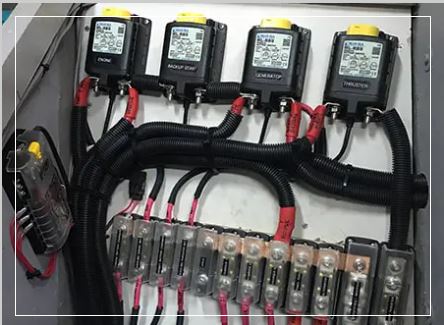
Knowing what to look for when problems occur will save you a lot of stress.
Too often, boat owners ignore glitches in their electronics, thinking it’s just a glitch. However, the electronics are sending a warning that something is wrong, such as faulty wiring, corrosion, damage, or faulty installation. Luckily, many common problems can be traced to simple, solvable issues that can easily be remedied. By knowing what to look for when problems occur — along with some of the common fixes — you’ll save yourself a lot of stress. Here are some tips for troubleshooting your marine electronics.
Check the Power First
Check the power connection at the unit or fuses if any marine electronics system fails to power up. Many times the most straightforward answer is the correct one. Likewise, if an instrument powers up but nothing shows on the display, check the display brightness or contrast settings. These sometimes get changed so that displays aren’t visible under different light conditions. If you’re not picking up targets, you should be on the radar; for example, check to see if you’re on the correct range settings and have the gain and sensitivity adjusted correctly. For dual-frequency sounders, make sure you’re in the right frequency.
Test Your Equipment
A volt-ohm meter is the handiest problem-solving instrument you can have on board. You must know how to perform two basic electrical tests on your marine electronics. A voltmeter detects the presence or absence of voltage, revealing the source of many common electrical problems. An ohmmeter is a perfect instrument to find an open or broken wire or connection or a short in a cable or malfunctioning switch.
Crossed Wires
Some electronic devices seem so easy to install until you open the box and see the various colored wires. The colors are not for aesthetics; they serve a purpose. Some wires connect to power, some connect to NMEA ports, some connect to alarms and transducers, and so on. If the wiring is wrong, your electronic device and other components will not work.
Never Cut Cables
Some people think cutting or splicing cables when they are too long is okay. It’s not okay. Some cables are intentionally long for performance or require special treatment if cut or spliced. Cutting cables exposes the wires inside the casing, too, meaning moisture can get inside. Wires are wrapped for good reasons, which include keeping water out. Cut wires that aren’t put back together correctly can also cause shorts in the electrical system which can ruin the electronics or cause a fire.
Marine Electric Systems, LLC is a Leader In the Maritime Industry
We here at Marine Electric Systems have over 30 years of industry experience. You can trust our team for reliable service and expert craftsmanship in the Maryland, Baltimore, Annapolis, and Baltimore city areas! We’re highly certified and adhere to all ABYC and NMEA regulations. We specialize in top-notch electrical solutions for recreational, commercial, and government boating clients. Anything from electrical refits, to navigation systems, or boating maintenance. To stay up to date on our services, follow us on Facebook, LinkedIn, Pinterest, Instagram, and YouTube. You can also contact us at 410-263-0807.
